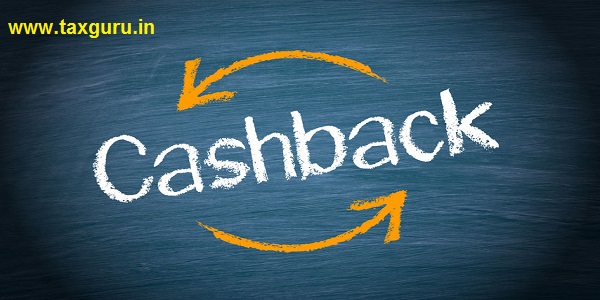INTRODUCTION: We often get tempted by attractive offers and cashbacks offered by various vendors when we make digital payments. Online shopping websites and some stores are offering cashbacks on use of certain credit cards or mobile wallets to pay for the goods. Travel websites are offering cashbacks on booking tickets, hotels or holidays by using credit cards or mobile wallets. Online taxi aggregators are offering cashbacks on taxi rides. Online food delivery order booking websites are offering cashbacks on orders. You can get cashbacks even on payment of your utility bills by using certain credit cards or mobile wallets.
Nowhere, it comes to our mind that certain cashbacks may attract income tax and what we cannot think of even as a nightmare is that if we do not disclose certain cashbacks as income, Income Tax department may initiate proceedings under Section 147 i.e. Income escaping Assessment for under-reporting of income. Any monetary benefit received by a person by way of gifts or cash backs from a Non-relative might be subject to income-tax under the head ‘Income from Other Sources’ or ‘Profits and Gains from Business or Profession’, as per the given facts and circumstances.
The cashbacks availed via UPI, debit or credit cards or any other mobile wallets may be taxable under certain conditions by taking into Cognizance section 56(2)(X) of Income Tax Act,1961.This section provides levy of tax if any sum of money is received without consideration if the aggregate value of such sum exceeds Rs 50,000 during a financial year. Section 56(2)(X) is not applicable on freebies in lieu of cashbacks such as free movie tickets, pen drives or any other accessories unless they were purchased for business or arising from business or one’s profession. In cases where freebies are received on the purchases made in the course of business or profession they shall be taxable under Section 28(iv) of Income Tax Act, 1961 based on the market value of the commodity.
In order to understand taxability on cashbacks we need to differentiate between cashbacks and discounts. Discounts are reduced from the invoice value itself and the net amount is payable. However, in case of cashbacks, the customer has to make the full payment and then the cashbacks gets credited to the customer’s mobile wallet or Bank account. Also discounts can never be more than the purchase price although; cashbacks can exceed the price paid.
We can categorize the different attractive offers to woo the customers as:
INSTANT DISCOUNTS: These discounts are instantly deducted from the list price and the customer pays only the net amount. Now there can be 2 situations; either the goods can be purchased for personal consumption or for business or professional use.
PERSONAL USE-Not Taxable
BUSINESS USE-Depreciation is charged on the net amount paid and if the expense is revenue in nature then net amount paid is booked as an expense.
CASHBACKS: Cashbacks can either be real time or deferred:
- Real time cashbacks are offered immediately after paying for a transaction. For e.g. while booking movie tickets 10% cashback offer is available so immediately after the movie ticket is booked, Rs 100 shall be immediately credited to your mobile wallet as cashback earned.
- Deferred cashbacks are cashbacks which are allowed after a certain pre determined time specified on the payment time that may vary from 1-3months.For e.g. Mr. X purchases mobile phone through Amazon and earned 10% cashback from his credit card of HDFC bank with a condition that such cashback shall be offered within 90days.
In case of cashbacks also 2 situations can arise either they can be earned from goods purchased for personal use or business use.
- PERSONAL USE: Taxable under head Income from other sources if total amount of cashback exceeds 50,000 in a financial year as per 56(2)(X).
- BUSINESS USE: If it is capital expenditure then Depreciation is charged on the net amount paid and if the expense is revenue in nature then net amount paid is booked as an expense.
Also what should draw more attention is if Mr. A receives gift from a non relative worth Rs30000 and cashback from different wallets turn out to be Rs 22,000. Then the entire receipt of Rs 52,000 shall be taxable in hands of Mr. A under Income from other sources by invoking provisions of Section 56(2)(X) of Income Tax Act,1961.
CONCLUSION: Hence in this world of Digitalization and raining cashbacks we should also keep a watch on cashbacks received during the year and verify whether these are under any ambit of income tax, so that it can be disclosed in the income tax return and avoid the Reassessment Notice U/s 147 for under-reporting of income.






